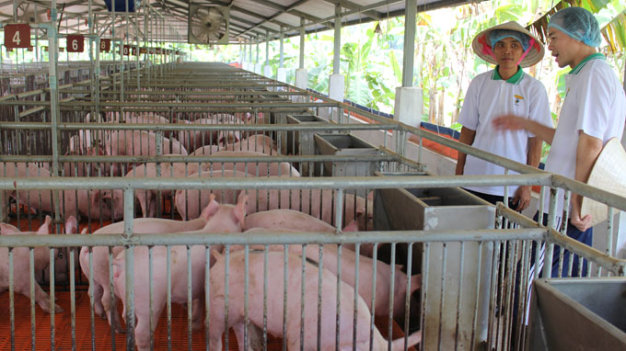As Vietnamese animal feed producers are bracing to take back what should have belonged to them, their foreign rivals are trying to hold their ground and will not give up without a fight.
>> An audio version of the story is available here
Masan Group, a big Vietnamese listed firm with US$500 million spare cash in hand, last month announced an ambitious plan to take 50 percent of the local market share in the next five years.
The firm, whose total market capitalization was over VND61.8 trillion ($2.84 billion) by the end of April, is one of three Vietnamese firms which have expressed their will to reshape the local animal feed industry to have a bigger share and reduce the influence of foreign competitors.
The local trio
Masan Group, has acquired Sam Kim Co. Ltd. and renamed it Masan Nutri-Science Co. Ltd. Because of this acquisition, Masan Group now owns a 52 percent stake in Vietnam French Cattle Feed JSC (Proconco) and a 70 percent share of Agro Nutrition Company (Anco), as Sam Kim has shares in these two firms.
Following the deal, Masan Group has become the second largest company in the Vietnamese animal feed market.
“The acquisition is a key step to increasing the productivity of Vietnam’s protein sector. Vietnam’s GDP per capita is one-tenth of the U.S., but Vietnam’s protein price per kilogram is 1.5-2 times more expensive,” the company said in a press release.
The acquisition and establishment of Masan Nutri-Science instantly provides Masan Group with a leading platform to serve the growing $6 billion animal feed sector.
Proconco is currently Vietnam’s biggest pig feed producer, while Anco is the second largest animal feed maker in the country.
The feed market also has two more names which are being put together with Masan to create a Vietnamese trio – Hanoi-based Hoa Phat and Hung Vuong in Tien Giang Province of the Mekong Delta.
Hoa Phat officially entered this market in March with the establishment of a feed production plant with a chartered capital of VND300 billion ($13.8 million). With a capacity of 300,000 tons per year, this group aims for a 10 percent market share in animal feed in the next five years.
Meanwhile, Hung Vuong has been involved in manufacturing aquaculture feed since 2007, and is deploying M&A strategies for expansion in 2015.
This year, the company will continue to increase the percentage of ownership in its subsidiaries and affiliates specializing in feed manufacturing like Viet Thang (with a target of over 90 percent), Agrifish (85 percent) and Sao Ta (over 51 percent).
Hung Vuong also plans new investment in its seafood feed plant in Vinh Long Province and animal feed plant in Dong Thap Province, both in the Mekong Delta.
Thus, with four companies specializing in processing animal feed, Hung Vuong aims to increase its production to 1.5-1.8 million tons of feed per year by 2018.
Foreign rivals still hold bigger shares
At the present time, foreign companies account for a smaller quantity but hold a 60-65 percent market share, according to a recent report by the Ministry of Industry and Trade.
In particular, the most shares are in the hands of Thailand-invested CP Vietnam Livestock Corporation, with 19.4 percent, followed by U.S.-owned Cargill Vietnam Co. Ltd. with 8.11 percent.
Also in the report, the Ministry of Industry and Trade mentioned the problem of possible market manipulation by foreign firms.
The local feed market is being driven by a number of foreign-invested enterprises, which have occupied a large market share, and are using a distribution system through exclusive dealers with large discount rates to compete with domestic enterprises, said the report.
According to local experts, the animal feed market in Vietnam has developed rapidly, with an average growth rate of 10-13 percent per year. The industry is expected to rise 5-5.6 percent in value against last year in 2015.
Vietnam is now the leader in ASEAN and the world’s 12th biggest animal feed producer.
Currently, demand for animal feed in Vietnam is about 16 million tons, worth about $6 billion per year, figures which are expected to reach 25-26 million tons, with tens of billions of dollars in worth by 2020.
|
In late May, a Philippine animal feed producer said it wanted to buy a number of companies producing animal feed in Vietnam, after last year's acquisition of Vinh Hoan 1 Feed JSC (VHF). Late last week, representatives of Aboitiz Group (Philippines) said Pilmico Foods Corp., a subsidiary of the group, had unveiled a plan to expand operations in Vietnam through the acquisition of a number of local animal feed manufacturers in the north of the country. Last year, Pilmico bought a 70 percent stake in VHF, a leading supplier of seafood feed in Vietnam. "We are aiming for Vietnam to expand the production of animal feed and a few companies have fallen into our sights," Filipino media quoted Sabin M. Aboitiz, president and chief executive officer of Pilmico, as saying on the sidelines of a company conference in Makati, the Philippines. According to Aboitiz, Pilmico is currently reviewing three companies in the north of Vietnam, and wants to reach final deals within the next two months. |
Like us on Facebook or follow us on Twitter to get the latest news about Vietnam!


















































